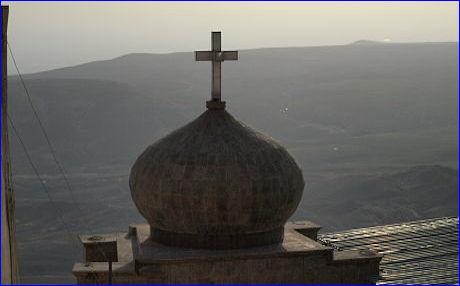Nineveh Province for Christians in Iraq? Let’s Wait and See

The Christian Mar Mattai monastry overlooking the Nineveh plain (Photo by Judit Neurink).
By Judit Neurink
ERBIL, Kurdistan Region — “It is one of the greatest moments of my life,” said the Iraqi Minister of Environment Sargon Slewa about the plan of the Iraqi Council of Ministers to establish a province in the Nineveh Plain. Assyrian politicians in and out of Iraq have lobbied for years to give Christians autonomy there.
Slewa, who is a member of the Iraqi Parliament and the AssyrianDemocratic Organization that represents Christians in Iraq, requested the establishment of the province. It is one of the three possible provinces the Iraqi cabinet decided to prepare a study on, besides Fallujah and Tuz Khurmatu.
The Nineveh Plain has the largest population of Christians in Iraq. They make up around 40 percent of the population of the planned new province. They now live in a so-called disputed area: Iraqi territory that Kurdistan claims for its autonomous region.
around 40 percent of the population of the planned new province. They now live in a so-called disputed area: Iraqi territory that Kurdistan claims for its autonomous region.
The approval of a study is a first step for the Iraqi Christian dream of governing themselves to come true. Since the fall of Saddam Hussein following the 2003 US-led invasion, Christians have been targeted by violence, and they highly value that their proposed province would have its own police and army to guarantee safety.
“This decision was taken to insure the continued existence of our community in the region. There is much work to be done, but this was the main step and the most difficult hurdle,” Sargon Slewa told the Assyrian press agency [sic], AINA.
Yet no celebrations were recorded in Iraq. Most Christians reacted cautiously to the news.
“Yes, you may congratulate me, but I do not believe it will really happen,” says Salim Kako, a former Christian member of the Kurdistan Parliament. He thinks the announcement is part of the election campaign for the upcoming Iraqi parliament, and is afraid it might not get anywhere because of that.
Reactions in the Christian town of Al Qosh, which is to be part of the new province, are quoted as “let’s wait and see.” There are still many hurdles ahead, people sense, as many of Baghdad’s decisions in the past have not been implemented. It might take some time until the infrastructure is in place that is needed for the province to get started.
Iraqi Christians living abroad showed happiness for the step taken. Many suggested that the province could make it possible for many that left to return.
“If implemented, this could change the reality on the ground for Assyrians and put them in a position to have a say on their future in Iraq, hopefully reversing the emigration to the West,” said Afram Barryakoub, the president of the Assyrian Federation of Sweden to AINA.
Since 2004, about half of the Christian population has fled the country, reducing the numbers in Iraq to about 550,000, of whom half are thought to be living in Iraqi Kurdistan.
Dr. Matay Arsan, president of the Assyria Foundation Netherlands, sees the province as an asset for Iraq’s stability. “The Iraqi Arabs and Kurds should realize that allowing the Assyrians to protect themselves and receive a part of Iraq’s budget would only prove that they, Kurds and Arabs, care for Iraq and its stability.”
The announcement about a Nineveh province follows a decision taken by the Iraqi parliament recently to recognize the Assyrian and Turkmen languages in Iraq. This allows public and private schools to teach in Assyrian. Next to that, the minister of education will open literacy centres for teaching Assyrian.
At the same time, the Christian exodus still continues. According to the Chaldean Church every day six Assyrian families leave Iraq.
They do not only flee the violence against Christians, the attacks on churches — 73 since 2004 — and the sectarian strife between Shiites and Sunnis. Many who were displaced to safer regions, like Iraqi Kurdistan, have not been able to find stable jobs or income. Generally, the impression is that the measures will not be able to convince Christians to stay.
stable jobs or income. Generally, the impression is that the measures will not be able to convince Christians to stay.
The plan for a Nineveh province may in itself even lead to sectarian strife. Mosul’s governor, Athil al-Nujaifi, recently mentioned the establishment of an autonomous province of Nineveh as a solution for the problems of the Sunnis in Iraq — not mentioning the Christians at all.
Sunnis feel discriminated by the Shiite majority, and protests have been going on for over a year. To Al Monitor, Nujaifi spoke of the despair among Sunnis, who feel that their situation will not improve. For that reason, he requested “a new project that has specific features”: the establishment of a Nineveh province.
At the same time, the province is referred to as the Nineveh Plain of Talafar, linking the new province to the (Shiite) Turkmen population that is living in the area around Talafar, and making it of interest to three major power groups in Iraq.
© 2014 Assyrian International News Agency

659877 997362This website is my inhalation, genuinely wonderful layout and Perfect written content material. 742028